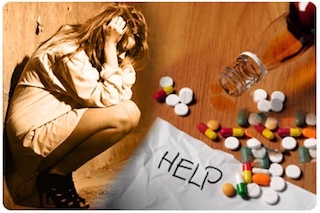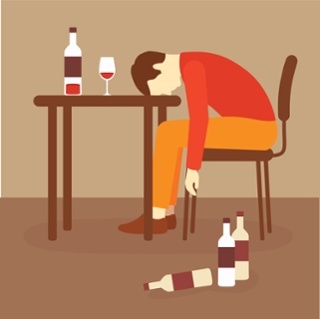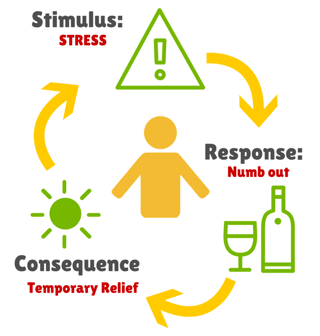 There’s a popular misconception
There’s a popular misconception
that just going to medical detox to clear the body of drugs or alcohol is all you need to heal your addiction.
Medical detox treats the physical but does nothing to address what caused your addiction in the first place.
What is Medical Detox?
Stopping drinking and using your drug of choice is an important initial part of addiction recovery. Detox - also referred to as detoxification or medical detox - is a period of time when the drugs and alcohol are physically removed from your system. This is often done under supervised medical care - such as The Coleman Institute or Gallus in Arizona.
If your addiction is severe, medical detox will be accompanied by withdrawal, defined as the physical and emotional symptoms that arise after you halt or reduce intake of your drug.
For many, medical detox is the beginning of the recovery process. But while detox is a good start, most of the time it isn’t a complete treatment for addiction.
What Drives Addiction?
Truly recovering from addiction typically involves more than medical detox. Why? Because most people dealing with addiction have what’s called a dual diagnosis: a mental health issue combined with substance abuse.
For example, alcoholism and depression are common companions in dual diagnosis.
 Though it’s true that some people have purely physical addictions, most are coping with physical addictions that came into being as a result of mental and emotional drivers.
Though it’s true that some people have purely physical addictions, most are coping with physical addictions that came into being as a result of mental and emotional drivers.
What is it that is causing you to use? When you know it will lead to bad consequences?
People don't usually start drinking or getting high for no reason. Most often, they began in an effort to cope with an something that's quite not right. An underlying core issue.
They self-medicate their issues, but then the alcohol, meth, opiates or whatever became a problem in and of itself.
Once you understand the nature of your addiction and the addictive cycle, the reasons why medical detox alone isn’t enough become clear.
Breaking the Addictive Cycle
Your addiction began not with drugs or alcohol, but with unresolved feelings of grief, anger, sadness, or some other trauma event.
Those feelings led you to numb out with drugs or alcohol. When you take away the addictive substances, you take away your preferred coping mechanism for emotional pain.
So what happens after you have overcome the physical element of addiction through detox and withdrawal and another powerful emotional stressor comes along?
 When stress hits us (stimulus), we normally respond in a way that would create a reward (response) to relieve that stress. Unfortunately, with addiction the initial reward is relatively short-lived and eventually fades (consequence). The addict will ‘chase the high’ and repeat the response over and over again.
When stress hits us (stimulus), we normally respond in a way that would create a reward (response) to relieve that stress. Unfortunately, with addiction the initial reward is relatively short-lived and eventually fades (consequence). The addict will ‘chase the high’ and repeat the response over and over again.
See more on breaking the addictive cycle,
In short, medical detox takes away your physical dependence on a drug, but it doesn’t give you a new way to cope when stress hits your life.
When Medical Detox is Sufficient
There are times when medical detox alone really is enough to treat an addiction.
For example, say that you have developed an accidental addiction to painkillers. Perhaps you were prescribed opiates post-surgery and now you’re hooked.
The important point in this scenario is that you are not taking drugs as a coping mechanism for anything other than physical pain. Getting physically addicted in this way a problem, but the solution is fairly straightforward.
In such cases, going through a medical detox program will likely allow you to break free from the physical addiction. You may receive opioid addiction medication and a taper protocol too.
When your body and mind are in withdrawal and you are craving your drug intensely, supervised detox will give you a way to get through the discomfort of getting clean.
When Medical Detox is Insufficient
However, medical detox alone isn’t sufficient to heal most addictions.
Since most people dealing with addiction have a dual diagnosis, there are usually underlying emotional issues driving their overuse of drugs and alcohol.
Detox only involves healing at the physical level.
It doesn’t heal the deeper issues fueling the addictive behavior. In truly holistic addiction treatment, you receive guidance and support in healing on all four levels of self: physical, mental, emotional, and spiritual.
Types of Addiction Recovery Programs and Facilities
If you’re dealing with a severe physical addiction, it’s imperative that your medical detox takes place under the supervision of trained medical personnel in an appropriate facility.
That way, physicians and staff can help you manage withdrawal and allow you to move through the detox process more swiftly.
In an inpatient setting, detox typically takes 3-10 days.
But how do you know which type of addiction treatment facility is right for you and your detox process? Most addiction treatment options fall into three broad categories:
- Detox-only facilities
- Detox and rehab combination facilities
- Rehab-only facilities
There’s no one right setup for every single person, as each type of treatment options has its own particular pros and cons. Consider your specific situation as you evaluate the possibilities.
If you’re looking for detox-focused options near Seattle or LA, check out our blog posts Seattle Addiction Treatment and Medical Detox Options and LA Medical Detox Cost Comparison: How Much is LA Detox Really Going to Cost?
Medical Detox-only Facilities
Pros:
Supervised medical detox helps to minimize uncomfortable and potentially dangerous withdrawal symptoms. Best for individuals with a strictly physical substance addiction.
Cons:
Doesn’t provide support for healing underlying core issues that perpetuate addictive behaviors; ineffective for individuals with Dual Diagnosis unless they plan to attend a rehab-only facility after completing detox.
Detox and Rehab Combination Facilities
Pros:
Convenient for individuals who require both physical detox and rehab.
Cons:
May emphasize one service over another; for example, may not provide substantive oversight for detox process, or may not have a sufficient mental, emotional, and spiritual recovery program in place post-detox.
Also, may have participants at various stages of the recovery process entering and exiting the program, which may increase tension and derail progress.
Rehab-only Facilities
Pros:
Welcomes only individuals who have completed detox, thus minimizing potential stress and turbulence. Also more likely to emphasize and teach the mental, emotional, and spiritual aspects of recovery as physical dependence is no longer an issue.
Cons:
Participants may need to enroll in a detox-only program prior to attending.
Rehab-only Specializing in Dual Diagnosis
The Clearing is a rehab-only addiction recovery program. Since we do not offer a medical detox program on-site, we partner with trusted programs to help participants detox prior to arrival.
We’ve found that when people move through detox before attending our program, they have an opportunity to home in on the root causes of their destructive behavior during their stay with us.
Once the process of physical withdrawal is behind them, they are empowered to focus on the real issues behind their addiction.
And that’s where we come in. Our evidence-based approach is based around healing those underlying core issues, so that lasting recovery can be achieved.
To hear how we've helped people just like you, click the link below to view our testimonials:
View Testimonials
Or, click on the link below to download a free copy of our eBook, "Healing Underlying Core Issues."
Download eBook:
Healing Underlying Core Issues



